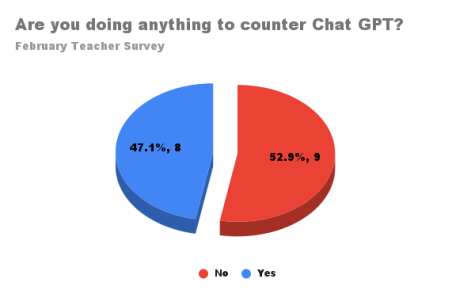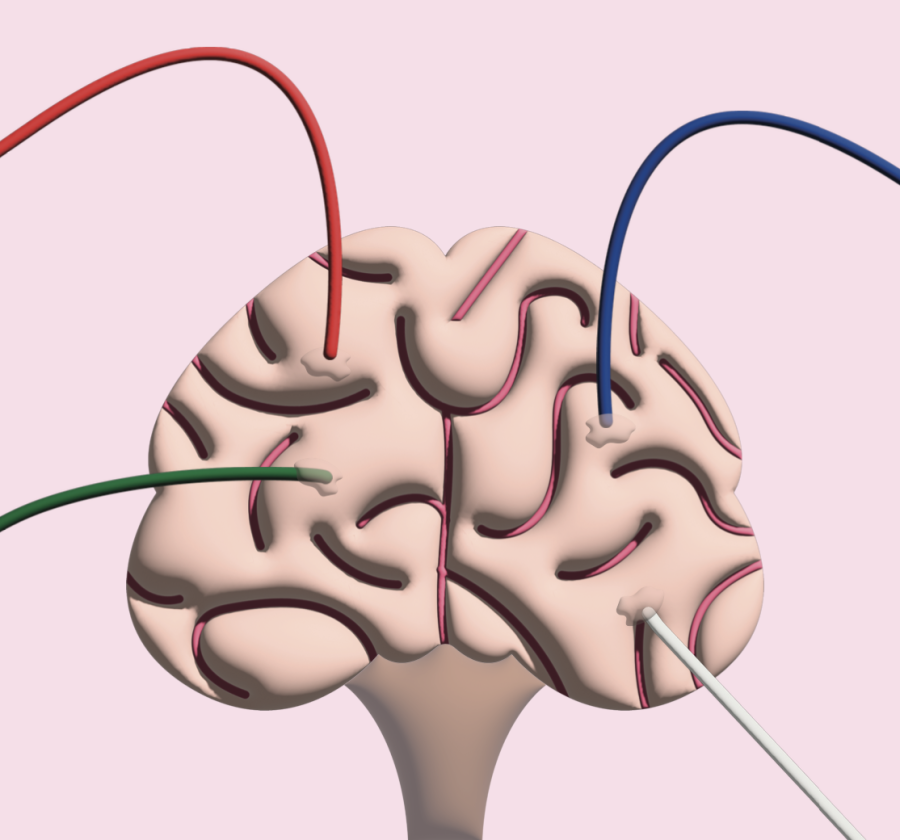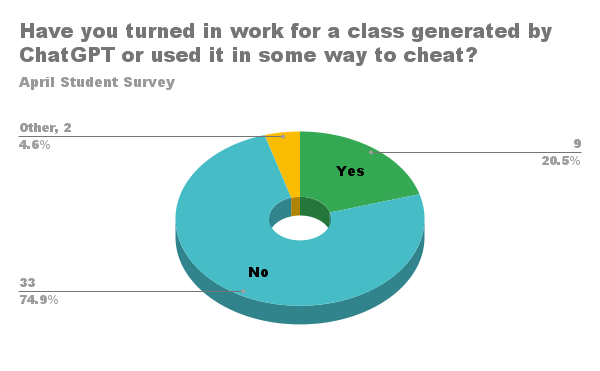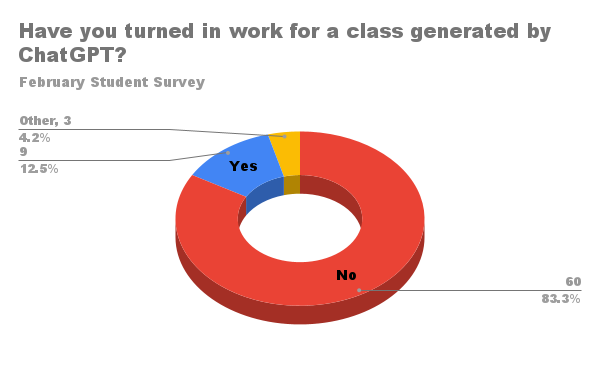WIRED: Groundbreaking convenience or the end of writing? Whatever it is, ChatGPT adds shortcuts to schoolwork.
Chatbot or cheatbot? Students and teachers are finding ways to use, or not use, ChatGPT
June 1, 2023
A Boiling Point survey on ChatGPT found that as of April, just five months after it was introduced, 61% of Shalhevet students responding had used it, and 21% had either turned in classwork generated by the AI program or used it in some way to cheat.
At the time, which was just after Pesach break, 49 students answered the survey on Google forms, and of those, 66% said they had an account with ChatGPT while 34% did not. The survey was posted to Schoology and on grade group chats on April 18.
In an earlier survey, posted in February and with 72 responses, 50% of students said they’d used it, 67% had an account, and 13% said “Yes” when asked if they had “turned in work for a class generated by ChatGPT.”
Together, the two sets of results suggest that while the percentage of students with access to ChatGPT has risen about 15% since the months it first was out, the percent using it to cheat or otherwise assist them with schoolwork has doubled.
ChatGPT is on the rise at Shalhevet as it is everywhere, and while there’s much disagreement about its implications for the future, from students to faculty to administration the Boiling Point found no shortage of people willing to share how they’re responding and why.
Among students, along with cheating some are using it as a help tool, idea generator, proofreader or substitute for web browsers like Google and writing aids like Grammarly. Some also use it to help them with research, essays and writing emails, while others said they used it recreationally, such as for recipes, planning trips or just experimenting with AI.
An example is freshman Gabe Mittman, who said that while he rarely uses it, it’s possible to do so in a way that isn’t dishonest.
“It can be very useful if you use it in the right way,” said Gabe in late March. “I think that it’s a really useful website, but you just have to use it in the right way, like not just taking your homework, putting it into and asking it to regenerate a response for it.”
He said ChatGPT can provide “a quick answer to a question” if you’re stuck, or a class assignment could be to analyze the accuracy of what ChatGPT responded to a prompt.
However, some do use ChatGPT to cheat and improve or speed up work they’re doing themselves.
“I still do all the work, but it’s like I’ll put my entire essay in that I’ve written very hard at and gathered my information from the notes or whatever, and I’ll put that essay in” the bot said junior Chaim Cohen.
“Like, my point I’m trying to get across is X, can you help,” he said. “Like, what can I do to this essay to help me change that? And then it will give me an idea.… I’m not just copying and pasting straight from it and putting it in there, I’m still editing it and refining it. It’s just a matter of helping me format things. It’s a learning thing that’s teaching me things that teachers haven’t.”
ChatGPT is an online chat bot program that is able to respond to user-inputted questions or statements in full sentences, often in paragraph or essay format.
Described as the fastest growing internet tool by Machine Learning Yearning, MLY.org, it was launched on Nov. 30, 2022, by OpenAI and currently has over 100 million users, and as of April 7, ChatGPT receives roughly 10 million requests every day.
The bot’s many abilities include answering questions, conversing with the user, writing responses to user questions, giving math formulas, coding computer programs, generating speeches and translating text.
Students have voiced ethical questions about the use of AI, for school work and in general, while teachers’ reactions have likewise ranged from acceptance to appreciation to extreme distress.
Senior Sean Silver said with AI-generated art, you can’t be sure who is the creator is, since it was not created by a human. He’s also worried that AI will be adapted to slightly change new medicines so they can create biological and chemical weapons.
“If they switched like one variable, it started developing poisons,” said Sean, who is planning to study computer science and artificial intelligence in college.
Junior Mordechai Heller thinks ChatGPT is changing the world more positively, though it might hinder individual thought.
“It’s inevitable there’s gonna be some sort of technology that allows people to have access to more resources and access to more technology that might make things like cheating easier,” Mordechai said.
“With all major changes like this, I feel like there’s always negative aspects to it,” said Mordechai. “When it comes to copy-pasting, in that sense it’s maybe like a little bit easier than it was before – which I guess could be negative because it takes away people from thinking and it makes it more like robotic in a sense.”
Junior Olivia Orbuch had a more drastically negative view of the bot, at least for homework.
“When it comes to school, it’s completely not okay, and should not be a viable option for a student if they’re in a bunch when it comes to homework,” said Olivia.
She described an incident when she found her partners using ChatGTP on a group assignment.
“Two of the students in the group, their work didn’t sound authentic to what they would generally write,” she said, so she put it in a AI detector and it came out as 65.25% AI-generated.
“They had changed the words… and they thought that because they changed the wording it wasn’t ChatGPT-ed,” Olivia said. “I think a lot of students today now do that in class, and they think that because they’re changing the word ‘demonstrate’ to ‘show’ or such things like that, it makes their stuff not ChatGPT. But it is, and it’s a huge problem.
“Afterwards, they wouldn’t change it, and I spent three hours changing it,” she said. “I had to rewrite the whole thing, because the whole idea was ChatGPT.
“The fact that I thought it was AI-generated and I was right is a problem,” said Olivia. “That it’s so obvious that a student would know … that is such an issue.”
Officially, Shalhevet’s reaction so far has not been to ban ChatCPT. Responsibility to deal with the AI bot has been left entirely to the discretion of teachers, whose reactions have ranged from elaborate new systems to block it to not changing anything at all.
Principal Mr. Daniel Weslow said the school would not make a quick decision.
“I love that our community as a faculty and an administration is not saying, like, ‘Oh this needs to be banned’ or ‘This needs to be a zero-tolerance-type situation,’” said Mr. Weslow in an interview.
“This is one of those things where it’s like — okay, this is a resource and a tool, and we’re gonna figure out how to use it effectively within our school community – under certain parameters, of course.”
He suggested such uses as “helping students with writer’s block, helping students realize that artificial intelligence may not always be accurate, and fact-checking sources.”
Some teachers, however, have strictly banned it and incorporated new assignment rules to help ensure work was not created with the help of AI. Others are not taking action at all – some because it does not affect the subject they teach as directly, like math, or as often, like Judaic Studies. Still others are using it as a tool to enhance learning, such as by using it to improve students’ writing skills or as a basis for research.
In an anonymous Boiling Point survey, five of eight General Studies teachers responding said they were taking actions to counter ChatGPT, along with one of six responding teachers of Judaic Studies. In all, eight of 17 teachers surveyed in mid-February said they were taking action to combat it.
Of two who said they teach both Judaic and General Studies, both wrote that they were taking action. A lone response from a College Counselor said they were not doing anything to counter it.
Art teacher Ms. Sam Garelick, who teaches art classes for underclassmen as well as Honors Art History and SAS Studio Art for upperclassmen, said her students can use it if they follow certain guidelines.
“If you want to use ChatGPT, go ahead,” said Ms. Garelick, speaking at a Town Hall about the topic on Dec. 21. “You need to let me know that you used it, and then you need to go ahead and check all of the things that it gave you, and then find the key points, distill them, and put them into a slideshow or something.”
In some of Ms. Nancy Fasules’s English classes, she has been requiring that in-class essays be handwritten. Students write their first draft using pen and paper with, have notes and their book and will turn in a draft at the end of class.
“When the assignment is finished – a paper will take more time obviously than a paragraph – we will take a day-or-two break from the assignment,” Ms. Fasules wrote via text message to the Boiling Point. “Then, with fresh eyes, students will type their paper into a Word doc. Students can make compositional changes – grammar, spelling, syntax, capitalization etc and minimal content changed. They cannot add a great deal more information.”
Mr. Dylan Ross, who teaches Film Literature and freshman English, is using ChatGPT to teach his classes about AI.
“We put in the prompt for an essay and then critique what ChatGPT produces,” wrote Mr. Ross in the Boiling Point survey. “We’ve found in class that, on the whole, it doesn’t actually produce the complexity of thought that human beings can, nor does it have the ability to seamlessly connect ideas between paragraphs … It (as of yet) is unable to produce true depth of thought.”
English teacher Mr. Brian Forrester wrote that he is not doing anything to counter the new technology.
“We are focusing on finding innovative ways to use it honestly and responsibly as a tool for improving our writing skills,” Mr. Forrester wrote in the survey. “It’s just a tool. Any tool can be abused, and the abuse must be confronted. That doesn’t mean we should be afraid of it.”
Students, meanwhile, are admitting they use it for what a teacher would deem cheating, creating detailed justifications for specific micro-uses.
Chaim Cohen said that he uses ChatGPT as part of his editing process – the way he uses Grammarly.
“Before ChatGPT I was always still considered a good writer, so whether I’m using it to help me or not isn’t making a difference between a bad writer and a good writer,” said Chaim. “It’s just slightly more refined, it’s helping me in a way that Grammarly seriously did.
“And also there are times where it’s like, I’ll put information into it and be like what would you recommend to get this point across easier? It’s like asking a person, it’s just at my disposal whenever I want,” Chaim said. “You can use a source without plagiarizing, you could use ChatGPT without cheating.”
A female upperclassman who wished to remain anonymous said she uses ChatGPT to summarize readings.
“There was this long Civics assignment that we had to do, and I didn’t have time for it and I needed to get the main idea of – I think it was like we had to read this letter,” the student said. “And I asked ChatGPT to summarize the letter for me so that I can do the assignment, and it quickly did that.
“And I do that for a lot of different classes, which I try, I try my best not to do. But sometimes when I’m gonna use Google, I’m like ‘No, let me just ChatGPT it,’ because the answers are so much more elaborate.”
She said she wouldn’t use ChatGPT in classes like English where “writing is important and that would be an extreme shortcut, and we would basically be cheating,” or “copy-and-pasted exactly word for word what it said,” she said. “I might have once or twice changed the words of something and made it into my own, but it’s mostly just getting the main idea and then using it and putting it in my own words.”
She compared it to using Sparknotes.
“Although it’s wrong and we shouldn’t do it, sometimes like we’re so busy as it is, and I need to submit my work and so it’s just a faster way to get things done,” she said, and compared it to asking for help from her mom.

“It’s the same way I would ask for help from a human,” she said, “because you’re able to ask so many different questions, and it’s able to help with so many different things.”
Nevertheless, some teachers have fully disallowed the use of ChatGPT for completing assignments.
History department chair Dr. Keith Harris, who teaches eight classes, changed his class policies as of Jan. 1, 2023, for all of his classes, to combat ChatGPT.
“I am requiring all students to utilize and provide citations for assigned materials and class discussions on written assessments,” Dr. Harris wrote in the Boiling Point survey.
In his updated policy, he wrote, “The use of ChatGPT or any other chatbot for any reason is strictly forbidden in ALL circumstances. Turning in another person’s work or AI-generated material and claiming it as your own will be deemed cheating.”
Four teachers who responded to the survey said they’d assign more in-class writing. One wrote of using another application, ChatZero, to check suspicious work.
Dr. Sheila Keiter, who teaches both Judaic and General Studies, said she’s “emphasizing novel conceptualization, which ChatGPT lacks.”
“It actually is going to make things harder for students, since the level of writing I will expect must exceed ChatGPT’s capabilities,” wrote Dr. Keiter, who teaches Talmud and SAS Eurasia this year.
Regardless of strategies, Ms. Fasules, who despairs of ChatGPT’s influence on all of writing, referenced a quote from Gertrude Stein.
“Gertrude Stein said, ‘If we all wrote for three hours a day, we’d all be great writers,’” Ms. Fasules said wrote in her response to the Boiling Point’s survey. “In other words: the only way to learn to write is to write. It terrifies me. So many kids are already cheating easily and without concern or conscience. Now they will become illiterate cheaters. God help the country when they are adults and vote.”
ChatGPT also has its limitations. It cannot issue an opinion when asked and instead it will likely say so and might give the main perspectives on both sides of the argument as a substitute.
For example, when asked “Which do you prefer: chocolate or vanilla,” it responded:
“As an AI language model, I don’t have personal preferences or tastes like humans do, so I don’t have a preference between chocolate or vanilla. However, I can provide information and answer questions about chocolate or vanilla if you have any.”
It also cannot reliably provide sources for its responses. When last asked by the Boiling Point, it was unable to do so on multiple attempts. However, when asked why it had been able to provide sources previously, it wrote, in part:
“As an AI language model, my responses are generated based on a mixture of licensed data, data created by human trainers, and publicly available data. I have not been directly trained on specific sources or have access to proprietary databases or citation management systems.”
Other companies have also released AI Chatbots, among them SnapChat’s “My AI,” “Google’s Bard” and Microsoft’s “Bing AI.” There is also an iOS app of ChatGPT, as well as many other mobile apps with similar features to ChatGPT.
One thing that seems certain is that ChatGPT will not be the last word in consumer-oriented AI development. Challenges will likely evolve and continue, as will public attitudes.
Senior Sean Silver said he doesn’t trust ChatGPT since he doesn’t know where it’s getting its information.
“I’m not gonna use it for writing my essays or anything, which a lot of people do end up using,” said Sean.
Mr. Weslow said Shalhevet’s administration is currently discussing next year’s policies and plans to include explicit wording relating to ChatGPT in next year’s handbook.
“We’re not banning it; we’re not hiding from or trying to avoid it,” Mr. Weslow said. “We know students are going to utilize it and we’re really talking about utilizing it effectively and thoughtfully in our classes.”
He said administration and faculty were in discussions on “parameters around use” of ChatGPT, but that the Student Handbook already encompasses ChatGPT-related offenses in its section on academic integrity.
The handbook states: “Students who plagiarize and/or cheat will be subject to disciplinary action” and “Students caught plagiarizing or cheating will receive no credit … on the assignment in question and will not be allowed to make up the work for credit.”
“You know, we’re not seeing this as something that’s gonna be the end of students being able to write authentic papers, or increased academic integrity issues,” Mr. Weslow said. “We’re flipping it. We’re saying, ‘Hey, how can we use, how can our students utilize this in a positive way that still showcases their own skills and their own writing.’ And that’s the conversation we’re having.”


